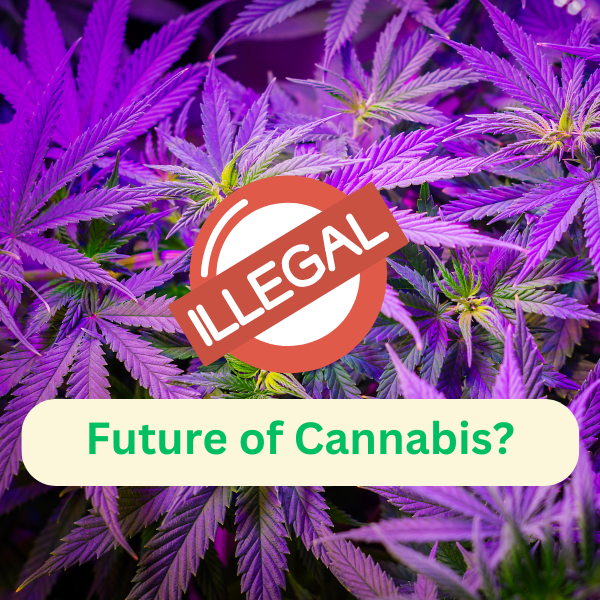Marijuana Controversy? On the remarkable day of May 16, 2024, US President Joe Biden took a major step towards the legalisation of marijuana.
He stated “no one should be in jail just for using or possessing marijuana.”
Biden, in collaboration with the US Drug Enforcement Administration (DEA), reclassified marijuana from Schedule l drug to Schedule llI. This permitted consumers to consume cannabis for both recreational and medical purposes.
Besides, recent studies have confirmed some promising usage of hemp in the pharmaceutical world. Its psychoactive abilities help consumers maintain an ideal work-life balance, allowing them to live a more balanced, stress-free personal and professional life in a much better way.
However, apart from having all these beneficial aspects, the legalisation of cannabis by the US President has been the most discussed topic in the country. Let us have a look at and understand the fundamental legal status of cannabis:
The ‘2018 Farm Bill’
In 1937, hemp and other cannabis plants were effectively made illegal under the Marijuana Texas Act at the federal level, and later, in 1970, they were made formally unlawful under the Controlled Substances Act.
Since the initiation of legalising hemp by Congress in the 2018 Farm Bill, the cannabis industry has developed remarkably. Through this act, hemp has been reclassified as an agricultural commodity, allowing its cultivation under strict regulations.
Typically, cannabis was never part of the conversation regarding farm subsidies, nutritional assistance, or crop insurance. Still, Senate Majority Leader Mitch McConnell’s bold assistance and leadership on the matter of hemp have brought cannabis plants into the limelight.
As a fact, the policy regarding hemp has changed drastically in the United States with this new legislation. However, some misconceptions still remains about what exactly the changed version of this new legislation states.
The ‘House Bill 5150’
Recently, House Bill 5150 was introduced by the United States Congress and passed by the Connecticut legislature—one of the significant movements in the history of cannabis regulations and industry. The bill is concerned with the rules and regulations and focuses on the expanding economy of cannabis and hemp products, such as cannabinoids containing substances like delta-9 THC, delta-8 THC, and cannabinol, which were regulated previously.
As the HB-5150 modifies, significant changes have been made to the act. The bill’s modified version states provisions for excluding cannabis-type substances such as cannabis seeds or plants and products derived from hemp. According to the act, these substances are classified under the controlled substances group.
The UK controversy
The hemp controversy in the UK has become a significant issue in the country. A few days ago, the UK experienced a major economic downfall due to a remarkable scandal surrounding hemp.
However, Chris Alexander’s resignation as the chief executive director of Cannabis Management later pushed the matter into further controversy.
The UK Governor, Kathy Hochul, appointed Chris Alexander to supervise the state’s cannabis management in 2021. The governor has stated that the agency is criticising New York’s attempt to launch adult-use marijuana sales as a “disaster.”.
After the House voted to legalise the use of marijuana for recreational purposes in 2021, only 130 stores for adults have opened since the retail licensing process has been slowed down.
“Make no mistakes; the smartest people in cannabis are here in this team and in this office, and they have been working tirelessly to launch new businesses, protect workers, and ensure products are safe for consumers and patients,” Alexander stated while announcing his resignation.
“They are doing the difficult work of market building while still educating the masses,” he added.
In the recent past, an amendment was made seeking the restriction of the intoxicating products derived from hemp and cannabinoid plants across the nation. The US Agricultural House Committee passed an en bloc amendment on Thursday that describes the elimination of hemp-derived products and other intoxicating cannabinoid substances.
At the markup hearing of the farm bill, six lawmakers directly addressed Amendment 35, with three opposing the matter and the other three in favour of the statement.
U.S. representative Mary Miller stated at the hearing, “My amendment will close the loophole created in the 2018 Farm Bill that allows intoxicating hemp products like delta-8 (THC) to be sold.” She was the Illinois Republican who introduced the hemp amendment.
Miller made an impeccable point that caught the attention of the members of the House Committee. She said, “These products are being marketed to children and sending hundreds of them to the hospital.”
She also added, “We must stop teenagers and young children from being exposed to addictive and harmful drugs.”
Countering the Amendment
On the contrary, U.S. Representative Jim Baird, an Indiana Republican, stated that domestic farmers who have already invested their time and money for the last six years to develop a domestic supply chain of hemp and hemp-based products will face significant difficulties due to these restrictions.
In the meantime, CEO and co-founder of the National Cannabis Industry Association, Aron Smith, emailed the members of the NCIA, saying, “There is a better, more rational third way: sensible federal regulations that apply equally to hemp and marijuana-based cannabinoid products.”
Conclusion of the Farm Bill
Towards the conclusion of the Farm Bill, the new revised version stated by the House concludes that the Farm Bill’s passage seems challenging to pass through the state’s legislation this year.
The hemp roundtable added, “We continue to have many friends in both branches on both sides of the aisle who will work with us to defeat this hemp-killing language.”





7 thoughts on “Marijuana at the peak of its controversy: Legal overviews”